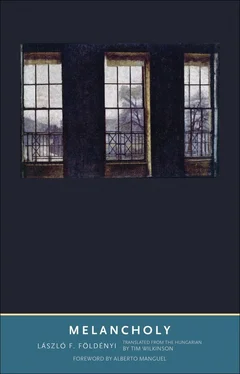The melancholic fears order just as much as disorder; his fear and the attendant sorrow show that he has failed to find solace in order. Try as he might to achieve order, it nonetheless elicits from him the most profound unease: order is much too arranged; there is no place in it for the “indigestible,” “inexpressible” character traits that utterly upset this order. The melancholic creates order but realizes that he has no place in it. And since he wishes to tidy up the whole world, he is forced to realize that his own person can appear in it only as a permanent deficiency, a great misunderstanding. But he is unable to regard deficiency as a normal condition, and in order not to be “alone” in his suffering, he makes deficiency the innermost essence of existence: his life is a misunderstanding, like existence itself. A state of anxiety characteristic of melancholia ( melancholia anxiosa ) is a fear of deficiency: but since the melancholic finds this not outside but in the very world of which it is the inner essence, the fear relates not only to deficiency, to nothingness, but to something as well. This paradox is painful for him, and consequently he experiences the world anew in an unprecedented manner: as a pile of ill-matched fragments that render the deficiency palpable. Although he lives in the world, he also moves along beside it, as it were, which is why the world gives the impression of being an external object, totally alien to the self. He is part of the world, but at the same time totally alien to it: left to his own devices, feeling homeless and expelled from everywhere, having no idea what purpose could be served by his unappeasable desire.
The desolation and terror that overwhelm the melancholic cannot be reduced to dejection or fear as they are commonly understood. He is sorrowful, but he also has an outlook on his sadness: he is well aware of the futility, the “‘senselessness” of grieving, and he relates to his sadness as to an object. He is sad, but also has nothing to do with his own condition, so he cannot be comforted either. He has sunk so deeply into gloom that he is capable even of being cheerful. The ancients discovered an intimate relationship between melancholia and mania, which has remained valid down to the present day. An eighteenth-century comic by the name of Carlini was a severe melancholic, and Byron, too, was melancholic, though his depression did not hinder him from being the center of any company. And Keats wrote in his “Ode on Melancholy”:
Ay, in the very temple of Delight
Veil’d Melancholy has her sovran shrine.
13
The same goes for dread, which is akin to, yet not synonymous with, fear. The melancholic fears order, fears the world, and fears nothingness; however, since he both is
in
the world and also
embodies
it, he is not just afraid, but is also able to keep a distance from his fear, and though it does not cease, he is able to realize that it is groundless. The fear transforms into dread: he is afraid of everything, even though
his fears have no palpable cause. One may fear mosquito bites, but normally one does not dread them; the melancholic, on the other hand, like the figures standing on the cliffs of Rügen in the painting by Caspar David Friedrich, is not scared even of imminent death, though he may dread existence itself. Dread does not have a specific cause, and since it relates to everything, it blurs the world, making everything look homogeneous. But things can be made indistinguishable only if one finds something that they have in common. To do that, one must deprive them of their individuality, take their specific reality for nothing. Dread, like dogmatism, renders the whole world null and void; however, nothingness ensconces itself in those who dread: in the end, the melancholic comes to fear his own personality most of all. Such a personality ends up in a double bind: he dreads that the world has been annulled, and since he is the exclusive cause of his dread, he feels fragile and yet free. But he also dreads the nothingness lurking inside him, with the world (which is not nothing in the first place, even though he sees it as such) towering over him and crushing him to death. It has been seen that the love and the dread of freedom are equally typical of the melancholic — in that duality, the pitfalls of the medieval notion of melancholia are revived: dread of freedom is a sin (since I withdraw from realizing the infinitely many possibilities inherent within me), and in the love of freedom, love directed at God should be expressed. Kierkegaard was justified in thinking that dread was a manifestation in the individual of original sin: “Dread is not a determinant of necessity, but neither is it of freedom; it is a trammeled freedom, where freedom is not free in itself but trammeled, not by necessity but in itself. If sin has come into the world by necessity (which is a self-contradiction), then there is no dread. If sin has come into the world by an act of abstract
liberum arbitrium
(which no more existed at the beginning than it does at a later period of the world, for it is a nonsense to thought), neither in this case is there dread” (
The Concept of Dread
, 45).
People who fear are not free, because they are at the mercy of whatever they fear; those who are in dread are likewise not free, yet in this dread there is nevertheless a chance of absolute freedom: they are entirely at the mercy of themselves. People who dread do not look “outward,” but focus inward, and they discover such a bottomless depth that they try to hold on to something at all costs. Yet anyone who has ever seen through everything can no longer be satisfied with the horizon of finitude; those truly in dread are unable to feel at home in the world. Faust is an embodiment of dread, and it takes narrow-mindedness not to discern the mainspring of his being in all-determining dread. Faust fears nothing, but he is in dread of himself: he dreads failing himself, and that is why he is incapable of reaching an agreement with anyone: his dread stems from his desire for everything, and his inner freedom from his dread. The nothingness, appearing on the finite-infinite boundary discoverable everywhere, is also a kind of no-man’s-land for a person who lives in dread. The melancholic, who has reached insight into (and experienced) nothingness masochistically, enjoys the fact that no matter what he chooses, it will cripple him, and therefore he abandons himself to vertigo , which utterly removes him from the clockwork-like circulation of the world, bearing in mind Goethe’s saying that true pleasure is to be had only where one feels vertiginous.
Vertigo concomitant with dread has nothing to do with fear; one fears a fall only if one is at the edge of a precipice and has solid ground beneath one’s feet. In dread, the solid ground vanishes, so the vertigo is in fact the fall itself. One does not necessarily have to fall. Kierkegaard aptly says that the reason for the dizziness lies just as much in the eye as in the precipice. As with dread, this too has no “external” or “internal” reason: if the melancholic were able to say what he dreaded and what induced his thoughts to dizziness, he would not be melancholic but “merely” bad tempered, sad, or angry. Self and world are inseparable in a mood; it indicates the original unity of the two, which is further attested by the fact that one is always in some mood: having moods in general cannot be contrasted with moodlessness — one can discern only contrasts between individual moods. The common psychological notion that there is some sort of mood “inside” people, which is reflected onto the world, and vice versa, that a situation “external” to us arouses a mood in us, are both erroneous. Unlike a sentiment, which is always linked to something, a mood has no object (or subject), because, to follow Heidegger’s train of thought, in moods one can discern the “how” of the situation of the human being; in a mood, existence unfolds before one as human existence. For the melancholic, this deep, original interdependence of the self and the world is obvious; and if he curses the world or himself, then behind the words one should notice something that cannot be referred to in words: he does not dread merely the world or himself, but also the fact that he is at the mercy of existence by virtue of his own life. Mood can at most be hinted at, but one cannot speak about it satisfactorily; as a matter of course, speech handles as objects things that are not only objects, and treats as subjects things that are not merely subjects. Speaking about one’s own mood, one inevitably reassigns the interpretation of being to a sentiment. That makes the impatient reaction of others comprehensible: “Come off it. There’s no need for the foul mood,” or “This is no time to be so cheerful.” Mood is incommunicable, and when someone is in a euphoric mood, he is just as isolated in his own way as the melancholic: the individual’s ultimate self-dependence (even loneliness) is exposed in mood. Compared with other moods, melancholia has a special role insofar as it is the only one that confronts itself as a mood. European thinking has been struggling since the time of Heraclitus with the dual experiences of reality common to everyone and the reality granted to the individual alone: the search for truth and the desire for an explanation of existence suppose and reject both. Every mood is intermediate between the two poles, trying to bridge them at ever-shifting points (a happy person, for example, believes he is able to share his joy with everyone, but then comes to realize that in truth he cannot do so with anyone). The melancholic occupies an extreme pole: he has no ambition to step into a reality common to everyone (hence his taciturnity, which was noticed by Aristotle), but proclaims (not verbally, but by his being) that man is incapable of accounting satisfactorily for himself, is unable to communicate himself to others.
Читать дальше












